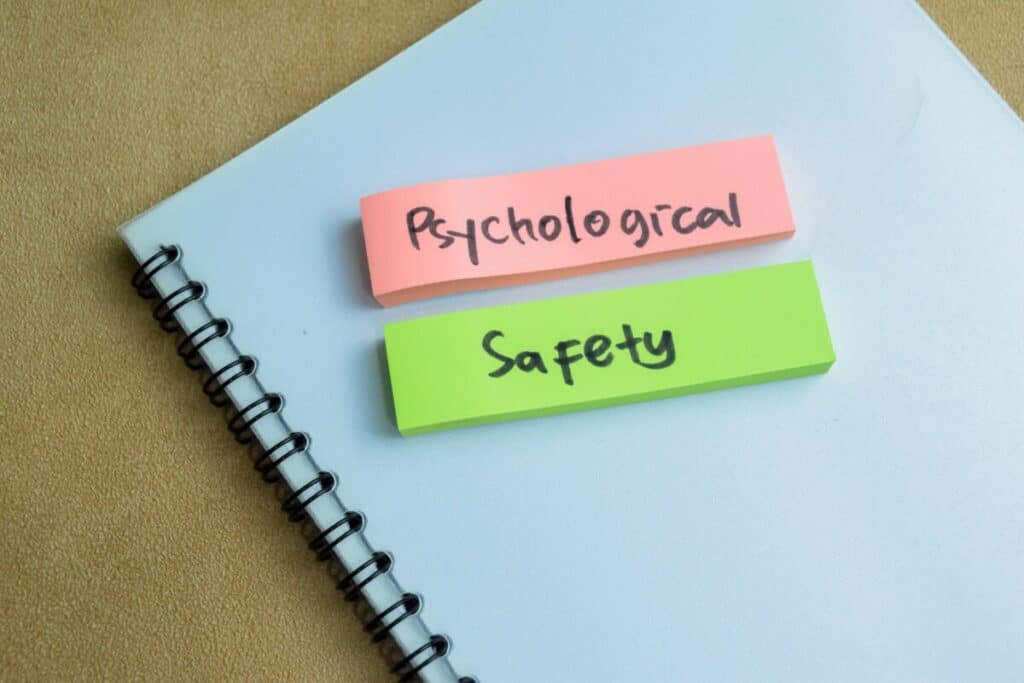The key factors that drive the success of teams in any industry are typically well-known, thoroughly researched, and with well-developed strategies for their implementation.
However, one critical aspect of high-performing teams, psychological safety, often gets overlooked and we seemingly fail to attribute it the importance it deserves.
The truth is that psychological safety is a foundational element of efficient and productive teamwork, especially in complex and dynamic fields such as business analysis.
Business analysts are often in situations to lead or work within teams, and, as change practitioners, they must operate in the environment where everyone can freely ask questions and put forward ideas, as well as admit mistakes and learn from them.
Below, we’ll take a closer look at what psychological safety is and why it’s so important for BA teams.
Table of Contents
What is Psychological Safety?
Psychological safety is a concept that promotes a workplace culture where everyone can speak up, ask questions, express concerns, and make mistakes without fear of being humiliated or penalised.
This idea was first researched by Harvard Business School professor Amy Edmondson
Psychological safety significantly contributes to the environment where vulnerability is accepted and not an object of ridicule and where team members can feel comfortable in their own skin, free to express themselves authentically.
When they work in a psychologically safe environment, team members are empowered to take calculated risks and admit when they don’t know something, knowing that they will be met with understanding.
The feeling of safety and the absence of fear of negative consequences lead to more open and insightful discussions and ultimately better problem-solving and decision-making. Needless to say, this paves the way for better solutions, driving organisational success.
Why Psychological Safety is Important for Business Analysis Teams
We already touched on the significance of psychological safety for business analysis teams and that importance can’t be overstated due to the collaborative, creative, and problem-solving nature of BA work
This means that for successful collaboration on business analysis projects, psychological safety is vital. The role of a business analyst typically involves identifying problems, proposing solutions, and implementing changes that affect the various parts of an organisation.
None of these tasks could be efficiently performed without a high level of communication, collaboration, and creativity. And, each of these factors thrives in a psychologically safe environment. The lack of psychological safety may cause team members to withhold some valuable insight or propose innovative ideas that could have contributed to better decisions.
The feeling of empowerment leads to a willingness to take risks, and that is how most innovative ideas that lead to breakthrough solutions are born. Knowing that success in business analysis often depends on the ability to question assumptions, think critically, and explore new perspectives, it’s not hard to figure out how critical this dynamic is for productive BA work.
Another important aspect of psychological safety that makes it essential for business analysis projects is the belief that mistakes are tolerated and even seen as learning opportunities.
Freedom to admit mistakes makes it more likely that individuals will learn from them which lays the foundation for both personal growth and team improvement. Furthermore, this type of mindset within the team shifts the focus from attributing blame to problem-solving which is one of the core tasks of business analysis.
Business analysts and their teams are often in a position where they tackle complex tasks that can challenge their ability for successful collaboration. They facilitate discussions between stakeholders with diverse interests, manage complex project requirements, and navigate uncertainty, so BA should work to create a safe environment for teams where they can:
- Ask clarifying questions: as they work on a project, business analysts will frequently need to ask questions to understand business needs, often challenging assumptions or requesting further details. It’s essential that, in these situations, team members feel free to admit that they don’t understand something without fear of judgment, because, otherwise, a potential issue may get swept under a rug and come back later to haunt the team.
- Challenge ideas: effective business analysis is not possible without critically assessing different potential solutions. A psychologically safe environment allows team members to take part in the process and offer different viewpoints or suggest alternatives, leading to better decision-making.
- Acknowledge mistakes: mistakes in business analysis (e.g., misunderstanding requirements) can prove to be rather costly and have significant project impacts. A team that operates in an environment that values psychological safety can quickly admit errors, learn from them, and course-correct without a culture of blame.
- Foster creativity and innovation: the environment where team members are comfortable sharing unconventional ideas is usually the perfect breeding ground for innovation. Psychological safety will typically encourage the kind of creative thinking necessary for solving complex business problems.

Benefits of Psychological Safety in Business Analysis Teams
Psychological safety brings several important benefits to business analysis teams and positively impacts their performance and outcomes. Here are a couple of reasons why psychological safety for business analysis teams is non-negotiable:
- Increased engagement and motivation: a team member who feels psychologically safe is more likely to contribute fully, knowing their ideas will be valued and seriously considered. This creates a more engaged and motivated team, which is the key prerequisite to a project’s success.
- Better problem-solving and decision making: open communication provides space for diverse perspectives and leads to better decisions. When everyone feels free to contribute, teams can evaluate multiple viewpoints, reducing blind spots and improving the overall quality of solutions.
- Improved learning and growth: psychological safety promotes a culture of continuous improvement. Team members are encouraged to admit mistakes and learn from them, driving personal and professional growth.
- Enhanced collaboration: a psychologically safe environment will foster trust among team members, enhancing collaboration. In business analysis, where stakeholders and team members usually come from different areas of expertise, trust is essential for seamless collaboration.
How Business Analysts Can Foster Psychological Safety
A business analyst is one of the roles that are in a unique position to influence team dynamics, especially when leading projects or facilitating stakeholder workshops.
This means that they can provide a meaningful contribution to creating and fostering a culture of psychological safety. Here are some strategies BAs can adopt to build a psychologically safe work environment:
Model Vulnerability and Openness
Leaders, including business analysts, need to be the models for the behaviour they expect from their team.
Admitting your own mistakes or uncertainties can go a long way in demonstrating that it’s okay for others to do the same and that there’s no shame in being wrong sometimes.
By publicly displaying vulnerability, BAs can set a tone of openness and humility for the entire team.
Encourage Open Dialogue
When performing activities on a certain project, business analysts will often act as facilitators between diverse stakeholders of varying responsibilities, expertise, and seniority.
The best way a BA can ensure that every voice is heard is to actively invite input from all team members or participants in a discussion.
In these situations, it’s helpful to use open-ended questions, like “What do you think about this solution?” or “What risks do you see in this approach?” to create opportunities for dialogue.
Create Clear Norms for Team Interactions
Establishing ground rules for communication and collaboration helps create predictability and fairness, two of the key elements of psychological safety.
For example, a business analyst can create an agreed-upon norm that no idea is too small or silly to be discussed, and that mistakes are viewed as learning opportunities.
Encourage Constructive Feedback
There can hardly be any continuous improvement in business analysis without regular feedback. Therefore, it’s essential to work on developing an environment where feedback is given respectfully and focused on growth.
When mistakes happen, the emphasis should be on learning from them instead of assigning blame.
Business analysts should encourage team members to give feedback to one another and ensure that it is always aimed at improvement rather than criticism.
Recognise and Celebrate Contributions
No matter how small, the contributions of team members should be recognised and celebrated.
Acknowledging when someone takes a risk, brings in a new perspective, or admits a mistake will help reinforce a culture where these types of behaviours are valued.
Additionally, regular recognition will promote a sense of inclusion and belonging among the team members.
Facilitate Psychological Safety in Stakeholder Interactions
Psychological safety should not be limited to just internal team members and should expand beyond the core team to include stakeholders.
When facilitating discussions with stakeholders, a BA should ensure that business users, technical teams, and anyone else involved in a project feel comfortable expressing concerns and offering feedback on proposed solutions.
This can help discover critical insights early in the project, prevent potential issues, and lead to better outcomes.
Promote a Growth Mindset
One of the best ways to develop a culture of psychological safety is to encourage the team to adopt a growth mindset, where challenges are seen as opportunities to improve rather than threats to competence.
This mindset helps reduce the fear of failure and supports a culture where continuous learning is embraced.

